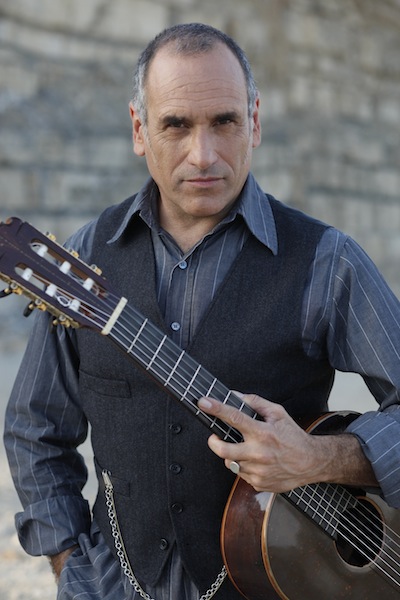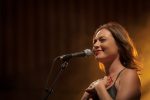David Broza (below) will be joined by Mira Awad in concert on Feb. 28, as part of this year’s Chutzpah! Festival. (photo by Nahum Leder)
Israeli singer-songwriter David Broza is returning to Vancouver – and he’ll be joined by friend and fellow Israeli, musician (and actor) Mira Awad. The two will perform in concert on Feb. 28 as part of the Chutzpah! Festival, which runs Feb. 16-March 13.
“I have known Mira Awad for about six years,” Broza told the Independent. “First time I saw her perform was at the Tel Aviv Cameri Theatre, which is one of the most important theatres in Israel. I was very impressed and started following her work. When I was ready to go into the studio to record the album East Jerusalem/West Jerusalem, I asked her to come and sing a couple of duets with me.”
While Awad and Broza may have met only a handful of years ago, Awad told the Independent, “I grew up on Broza’s music and persona, and admired what he did.”
The two crossed paths on more than one occasion after their first meeting, said Awad. “Later on, we met several times on stages and in life, until he called me and asked that I collaborate with him on his album and movie East Jerusalem/West Jerusalem. I was proud to join him on that brave project, and we’ve been performing together since.”
East Jerusalem/West Jerusalem, which features mainly Israeli and Palestinian musicians, was recorded over the space of eight days and nights in Sabreen Studio in East Jerusalem in 2013 and released the following year. Co-produced by musician (and actor) Steve Earle and music producer Steve Greenberg, the creative journey was filmed and made into a documentary by the same name, which also came out in 2014 – and is currently available on Netflix.
“(What’s So Funny ’Bout) Peace, Love and Understanding?” is among the songs featured on the album and in the film. As is clear from human history – and current events – peace, love and understanding are downright scary to some people. Nonetheless, Broza and Awad have dedicated their lives not only to music, but to peace and other social issues.
“I am a human being and I feel kinship with all other human beings. It is beyond my grasp how people can hurt other people like what is happening in the world,” said Awad. “I just cannot understand how one man can think that another is less than him, or deserves less. So, inequality and injustice, no matter where, are total obscenities in my opinion, and I feel obligated to do anything in my power to banish them.”

“I have always been involved in social activities, ever since I was a young boy,” said Broza, giving as an example his continuing work with people with disabilities and, in particular, with the Israel Sports Centre for the Disabled in Ramat Gan, which his father helped found when Broza was about 6 years old. “He would then take me along and ask me to help around,” said Broza of his father.
Broza also brings music to Shuafat refugee camp in East Jerusalem, which he discusses in the documentary East Jerusalem/West Jerusalem.
“The coexistence initiatives I have been involved with since I was 19,” he said, “are much due to my grandfather, Wellesley Aron, who, amongst many other initiatives, was one of the founders of the Israeli Arab village Neve Shalom/Wahat al-Salam, where the essential curriculum for peace studies and conflict resolution is developed. So, when I recorded my first written song ‘Yihye Tov’ (‘Things Will Be Better’) and it became a big success, I joined in all activities … in support of the peace process which had just started, [in] 1977.”
On the peace front, both Broza and Awad – and many others advocating for peace – face strong and even dangerous opposition.
“I would think that Mira probably has more of an issue since she is very committed to finding a way and is ahead of the pack,” said Broza. “I have been at it for so many years that it has become part of my being. I also believe in working with everyone when it comes to coexistence and conflict resolution, so I don’t exclude either the Palestinian side or the settler side. Of course, I am not immune to controversial and sometimes harsh commentary and opposition.”
In an interview last year with British online media outlet Jewish News, Awad – who was born in Rameh, in the Galilee, in northern Israel, and whose father is Palestinian and mother is Bulgarian – describes her situation.
“You call me Israeli Arab – but I call myself Israeli Palestinian and even that causes controversy,” she told the paper. “If I say that I am Israeli Arab, then my fellow Palestinians think that I am trying to disown my Palestinian roots and if I call myself an Israeli Palestinian, then the Israelis feel offended. They say: ‘If you are so Palestinian, go live in Gaza.’
“So, I identify myself only as an Israeli and not Palestinian. It mixes things up when you say both. The mere fact there is controversy around the definition might show you just a little bit of the situation faced by Israeli Palestinians in Israel. We are walking a very thin line all the time.”
In the song “Bahlawan” (“Acrobat”) and in a TEDx Talk, Awad describes how she maintains her balance in life, using the metaphor of an acrobat, who, she explains, must keep looking forward, both in order to not fall, but also to potentially “fly” (again, metaphorically).
“When you believe in something, when your vision is clear, you are like a good acrobat, you look onto the horizon and keep your balance,” she told the Independent. “If you start looking down, and calculate your risks, you will certainly fall and be eaten by the wolves waiting for you to trip. I think both David and I have a clear vision for what we believe in and, therefore, we keep our balance.”
“Empathy is the key,” said Broza. “You cannot think of yourself as the one who knows better than the other. Must learn to listen, always. I learn all the time from being exposed to such diverse people. With music, there is only one way, and that is to harmonize, so we keep eyes and ears open and stay in tune together.”
“The evidence is there, everywhere, that people just want to live, go to work, raise their children safely and take them on the occasional holiday,” added Awad. “We just need to encourage these silent masses to participate in the change process, to push their leaders towards resolution that is good for humans on both sides of the fence.”
One of the ways in which Broza attempts to do this is through music, giving benefit concerts, performing in hospitals and in crisis areas, offering workshops, and participating in or leading other social-minded projects and collaborations. “It is the backbone of my world,” he said of music.
“Music is my personal therapy,” said Awad. “As a musician, I deal with my thoughts, pains, joys, through music. Nothing stays cooped up inside, it is all put out into the fresh air, where everyone can see and hear it. But, in addition, I really feel that music has an advantage, it aims straight to subconscious levels, where people have fewer defences and borders, therefore, we as musicians can penetrate where other change-makers cannot.”
Broza is “very much looking forward to returning to perform in Vancouver and finally to take part in the Chutzpah! Festival.” He said his show will cover songs from his 40-year career, including some of his biggest hits, such as “HaIsha Sheiti” (“The Woman by My Side”) and “Yihye Tov.”
“It also covers my Spanish albums and some of the American albums,” he added. “The highlight is my having Mira join me on our songs from the album and film East Jerusalem/West Jerusalem, and she will be performing a couple of her own songs.”
For her part, Awad said she is “looking forward to arriving in Vancouver with this powerful collaboration. I cherish the friendship with David and the magic that happens when we are on stage together. I hope we convince all the people present how stupid and foolish all these disputes are, and that the things we have in common are way deeper than the stuff that divides us.”
David Broza and Mira Awad in concert takes place Feb. 28, 8 p.m., at Rothstein Theatre. For tickets ($43.75/$31.35), call 604-257-5145 or visit chutzpahfestival.com. Other music offerings include the Klezmatics 30th Anniversary Tour (Feb. 23), Marbin with the band MNGWA opening (March 3), Maya Avraham Band (March 7), Lyla Canté (March 9), Shalom Hanoch with Moshe Levi (March 8) and Landon Braverman and Friends (April 2). The festival also features dance, theatre and comedy.

